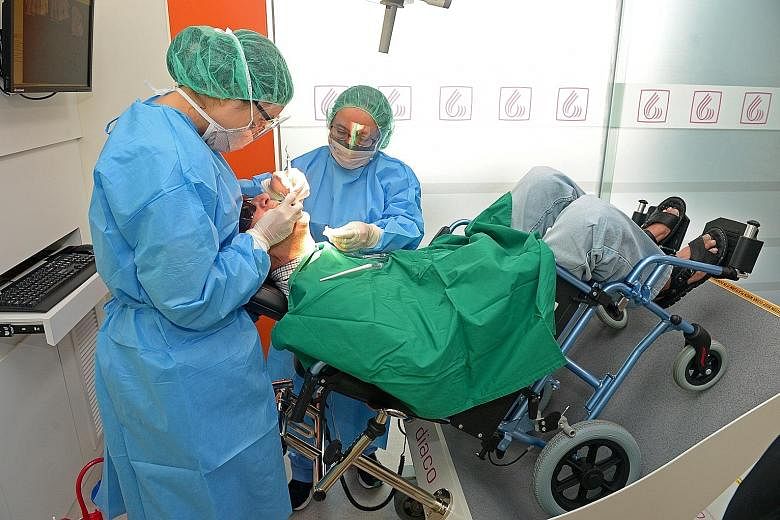Singapore is not training enough dentists to meet the needs of a growing and ageing population, resulting in many foreign and foreign-trained (Singaporeans and PRs) dentists being recruited.
In recent years, locally trained dentists make up less than half the new dentists registered each year.
In 2014, for example, 141 - or 75 per cent - of newly registered dentists were trained overseas. Only 46 - or 25 per cent - were local graduates.
A Ministry of Health (MOH) spokesman said the demand for dental care is projected to grow in the coming years.
Singapore's chief dental officer, Associate Professor Patrick Tseng, told The Straits Times: "With an ageing population, demand for dental services is not only increasing but also changing due to the more complex dental needs of geriatric patients."
To cater to a growing need for dentists, the faculty of dentistry at the National University of Singapore increased its intake from 48 in 2010 to 54 last year, the MOH spokesman said.
The number will continue to grow to an annual intake of 80 undergraduates with the opening of the National University Centre for Oral Health in about three years.
She added that half the overseas-trained dentists are Singaporeans or permanent residents. Foreigners account for only one in five dentists practising here.
Of the overseas-trained locals, 12 were recipients of a pre-employment grant where the ministry pays up to 60 per cent of tuition fees for the last two years of study at a recognised foreign dental school.
The grant is capped at $50,000 a year. These students are bonded, on graduation, to two years' service for a one-year grant, and three years if they received the full two-year grant. Another four grant recipients will be returning to work here this year.
The number of dentists here has grown by 40 per cent between 2010 and last year.
Singapore now has about 2,200 dentists, giving it a dentist to population ratio of 1:2,550.
Prof Tseng said Singapore is working towards a target of one dentist to 2,200 people.
Dr Raymond Ang, chief operating officer of dental chain Q&M, which runs more than 70 clinics islandwide, said almost a quarter of its 220 dentists are foreigners.
Dr Ang said the chain feels it is important to keep its "Singapore identity", especially in its heartland clinics, but does need to employ foreigners "to complement and supplement our team".
Prof Tseng said that "patients are also becoming more knowledgeable and aware of their dental health" and he foresees growing demand for preventive screening, treatment of root and dental caries as well as gum disease.
Older people will be looking at "conservative replacement of lost teeth".
To cater to the growing needs of older people, the MOH spokesman said the dentistry undergraduate curriculum "has been modified to better emphasise dental care for geriatric patients".
The ministry has also been encouraging more dentists to specialise in geriatric dentistry by offering scholarships for post-graduate studies in this discipline.
There are now seven such specialists in the public sector, who offer training and upgrading courses for general dentists.
Specialist dentists make up 16.4 per cent of dentists here, according to the Singapore Dental Council's 2014 annual report.
Almost a third of them are in orthodontics, providing mostly youngsters with braces to straighten their teeth.
Two in three dental specialists work in the private sector, as do almost four in five general dentists.
But with subsidies from the Community Health Assist and Pioneer Generation schemes, poorer patients can turn to private dental care.


